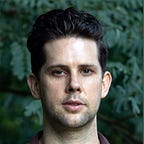Feeling into fear
Being afraid as you wake up to the injustice in our society is normal.
Some of us choose to live a political life out of guilt for our privilege. Others aim to right injustice that’s causing them and those they love to suffer. Most of us show up with a little bit of both. Either way, trying to step outside of American society’s deep injustice — what Zen monk angel Kyodo williams calls an “organism of destruction” — takes true bravery. Stopping the pounding waves of capitalism, white supremacy, and patriarchy will require collective power, but the decision to paddle against those waves is personal.
Chögyam Trungpa wrote, in his incredible book Smile at Fear:
“You shouldn’t try to cast fear out. Instead, fear should be regarded as the kindling to build a big fire of fearlessness.”
The point here is that we tend to reflect on our fear in a binary way — we’re either weak and afraid or brave and impenetrable, affected by nothing. That’s ego’s trademark dualism. “You have to realize fear as the starting point for fearlessness.” It’s through working with our fear over time that we learn to be strong.
Over time, our politics can come from a place of fearlessness rather than fear or guilt. But we’re dealing with enormous, deep, and violent problems in capitalism, imperialism, and white supremacy. It’s impossible to not be afraid — fear and its companion, guilt, are what keep us from true solidarity across class, race, and gender boundaries. They complicate our minds and cause us suffering. But they also seem to be common entry points for those deciding to move against the current.
Trungpa taught that fear is pervasive, always there. But not like paranoia — we don’t need to keep a basement full of canned beans and shotgun shells. This base fear is:
“fundamentally doubting yourself and feeling that you have some kind of shortcoming as a human being. You feel that you are constantly being short-changed somewhere in your life.”
I’m slowly getting better at noticing fear’s role on days when I just feel off. My habit is grasping for something to blame. A lack of sleep the night before, or too much socializing or not enough (loneliness) — whatever I whip up into a story that makes sense. These “answers” are seductive because they give me a sense of control — I have a solution, something to work on and something to do. I’ll start sleeping more. Or, I’ll stay in tonight and see friends tomorrow night. Sometimes I could use some sleep, but realizing that never makes the offness go away. It lingers.
What works for me is staying with the fear and feeling into it. Letting its energy rise up, appear somewhere in my body (usually my chest) and pass away. I think, everything may be unjust, but everything is basically okay.
When I recently read a speech by the feminist socialist Hilary Wainwright, what struck me was not her analysis of feminism or socialism, but her bravery. Particularly this line, which I underlined and have returned to a few times since:
“I was experimenting with a knowledge that the ending of capitalism was necessary, but without knowing what socialism was.”
This is an example of “don’t know mind,” the Zen Buddhist concept for an open mind free of opinions or concepts, i.e., empty consciousness in the moment. To sit still while knowing the problem but not the answer is frustrating. We’ve spent most of lives building habits for dealing with this uneasiness, like staying quiet, accommodating others to avoid conflict, or pretending we know the truth. These habits are full force when the problem is as deep rooted and global as capitalism. I’m certain that capitalism — or at least some systemic force, whatever we want to call it, that is misaligned with a healthy earth and our full human potential — is the sickness underlying many of our symptoms. Unsustainable climate change, poverty, widespread loneliness, the emptiness of most jobs; these are all rooted in an economic and social system that allows a select few to own the means of production, while most everyone else works for them — all the while the workers dream they’ll be owners too one day. This unequal system also thrives on scarcity, which fuels patriarchy and white supremacy. But I know far less about the alternative — what a classless society would actually look and feel like.
And to experiment in that unknowing space, as Wainwright reflects — to be okay with not knowing the answer but still trying, in front of and with others? That’s bravery. That’s how fearlessness is cultivated.
This post first appeared on futuredebris.com.
Want an email whenever I post? Sign up here.
